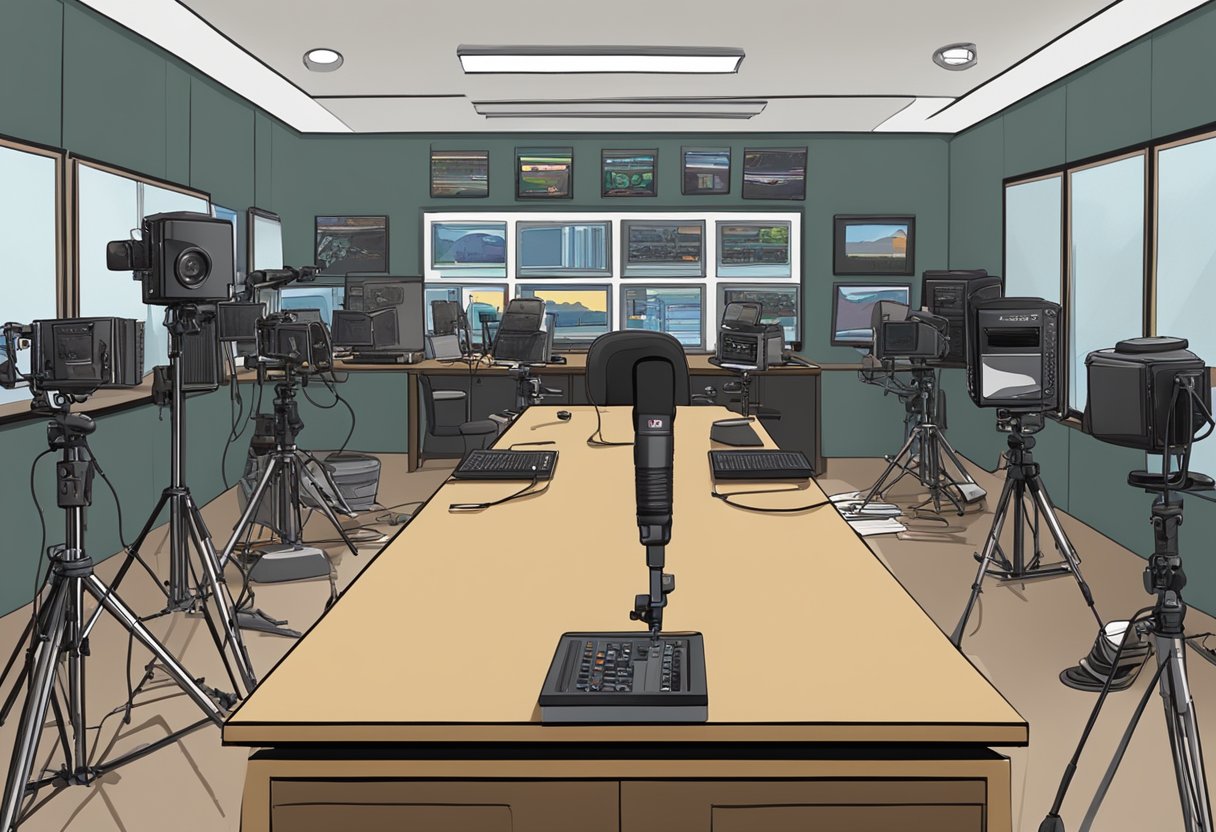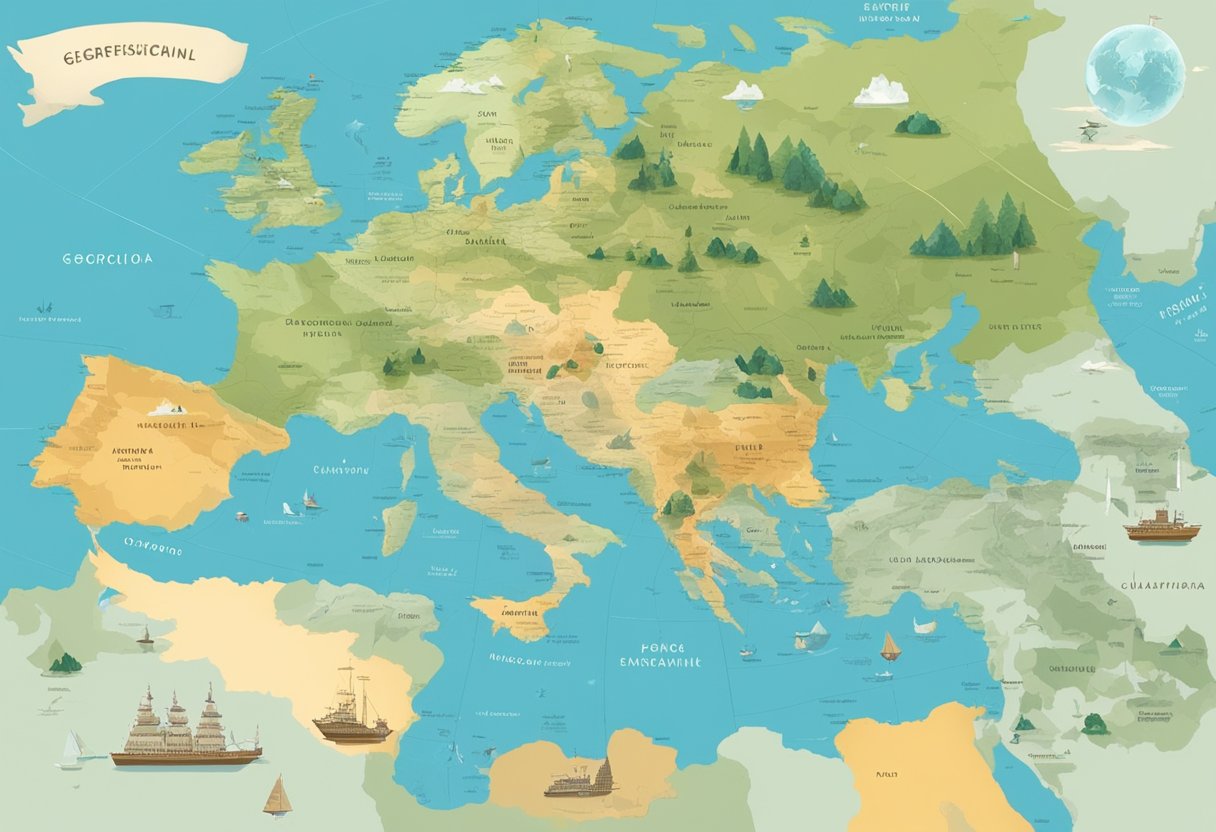Joe Rogan, the popular comedian, podcast host, and UFC commentator, is known for his long-form interviews with a wide range of guests from various fields. One of his guests, Peter Zeihan, is a geopolitical strategist, speaker, and author who has appeared on the Joe Rogan Experience podcast multiple times. Zeihan's insights on global politics, economics, and demographics have made him a popular guest on the show.

During his appearances on the Joe Rogan Experience, Peter Zeihan has shared his views on a wide range of topics, including the future of globalization, the implications of demographic trends, and the impact of climate change on energy production. He has also discussed the geopolitical implications of emerging technologies, the changing nature of warfare, and the role of geography in shaping global power structures. Through his engaging and informative conversations with Joe Rogan, Zeihan has provided listeners with unique insights into the forces that are shaping our world today.
Key Takeaways
- Peter Zeihan is a geopolitical strategist, speaker, and author who has appeared on the Joe Rogan Experience podcast multiple times.
- Zeihan's insights on global politics, economics, and demographics have made him a popular guest on the show.
- During his appearances, Zeihan has discussed a wide range of topics, including the future of globalization, the implications of demographic trends, and the impact of climate change on energy production.
Joe Rogan and Peter Zeihan
Peter Zeihan is a geopolitical strategist, speaker, and author who has appeared on Joe Rogan's podcast multiple times. The Joe Rogan Experience is a popular podcast hosted by Joe Rogan, which features a wide range of guests and covers various topics such as politics, science, and culture.
In Joe Rogan #1921, Peter Zeihan discussed his latest book, "The End of the World is Just the Beginning: Mapping the Collapse of Globalization." During the podcast, Peter Zeihan shared his insights on various topics such as the geopolitical landscape, the future of global trade, and the rise of China. The conversation was engaging and informative, and Joe Rogan's ability to ask insightful questions made the podcast even more enjoyable.
Apart from the podcast, Peter Zeihan has also appeared on Joe Rogan's YouTube channel, where he discussed various topics such as the Russia-Ukraine war and the possibility of a NATO-Russia war. The conversation was insightful and thought-provoking, and it showcased Peter Zeihan's expertise in geopolitics.
Overall, Joe Rogan and Peter Zeihan have a great rapport, and their conversations are always engaging and informative. Whether you're interested in geopolitics or just looking for an entertaining podcast to listen to, the Joe Rogan Experience with Peter Zeihan is definitely worth checking out.
Zeihan's Geopolitical Views
Peter Zeihan is a geopolitical strategist, speaker, and author who has gained a following for his unique and often controversial views on international relations. Zeihan believes that the current global system of globalization is on the brink of collapse, and that the future will be shaped by a return to more traditional power structures based on geography, demographics, and natural resources.
Zeihan's views on Russia and Ukraine have been particularly controversial. He believes that the ongoing conflict between the two countries is the result of a fundamental clash of civilizations, with Russia seeking to reassert its historical dominance over Ukraine. Zeihan argues that the United States and Europe have no real stake in the conflict, and should stay out of it altogether.
In addition to his views on Russia and Ukraine, Zeihan has also been an outspoken critic of China's rise as a global superpower. He argues that China's economic and political system is unsustainable, and that the country is on the verge of a major economic and political crisis. Zeihan believes that the United States should take advantage of China's weaknesses to reassert its own dominance in the global system.
Zeihan's views on energy have also been a major focus of his work. He believes that the United States will soon become the dominant energy producer in the world, thanks to its abundant resources of shale gas and oil. Zeihan argues that this will give the United States a significant strategic advantage over other countries, particularly China, which is heavily reliant on imported energy.
Overall, Zeihan's views on geopolitics are highly controversial, but they have gained a significant following among those who believe that the current global system is unsustainable. Whether or not Zeihan's predictions come true remains to be seen, but his work has certainly sparked a lively debate about the future of the world order.
Demographics and Globalization
Peter Zeihan is a geopolitical strategist who has authored several books, including "The End of the World is Just the Beginning: Mapping the Collapse of Globalization." In this book, Zeihan argues that the global trade system is collapsing due to a combination of factors, including demographics and de-globalization.
Demographics play a significant role in Zeihan's analysis of the global system. He argues that the demographic structure of countries, particularly the aging of populations in developed countries like the United States, is leading to a decline in economic growth and productivity. This decline, in turn, is contributing to the collapse of the global trade system.
Zeihan also argues that the Chinese system is particularly vulnerable to demographic challenges. China's one-child policy has led to an aging population and a shrinking workforce. This demographic shift, combined with rising labor costs and a slowing economy, is putting pressure on China's economic model.
The end of globalization is another key theme in Zeihan's work. He argues that the global trade system is unsustainable and that de-globalization is inevitable. This trend is driven by a combination of factors, including rising nationalism, the breakdown of institutions like the World Trade Organization, and the rise of new technologies that are making it easier for countries to produce goods and services domestically.
Overall, Zeihan's work highlights the importance of demographics in shaping the global system. As populations age and economic growth slows, the global trade system is likely to face significant challenges in the coming years.
Economic and Industrial Implications
Peter Zeihan is a geopolitical strategist, speaker, and author who has written extensively about the global economy and its implications. During his appearance on the Joe Rogan Experience podcast, Zeihan discussed several economic and industrial implications that could have a significant impact on the world in the coming years.
One of the key takeaways from Zeihan's analysis is the importance of re-industrialization policies in the United States. He argues that the country needs to focus on bringing back manufacturing jobs and investing in industries that have been neglected in recent years. This is particularly important in light of the multi-decade conflict that he believes is brewing between the United States and China.
Zeihan also discusses the Inflation Reduction Act, which he believes is necessary to combat inflation and stabilize the economy. He argues that this legislation would help to reduce the national debt and prevent the United States from falling into a financial crisis.
Another important implication that Zeihan discusses is the impact of industrialization on the global economy. He argues that countries that have invested heavily in industrialization, such as China, have seen significant economic growth in recent years. However, he also warns that this growth may not be sustainable in the long term and that countries that have neglected their industrial sectors, such as the United States, may face significant economic challenges in the coming years.
Overall, Zeihan's analysis provides a clear and knowledgeable perspective on the economic and industrial implications of current global trends. His insights highlight the importance of investing in key industries, reducing national debt, and taking steps to stabilize the economy in the face of ongoing challenges.
Supply Chains and Food Production
Peter Zeihan has been warning about the potential for food shortages due to supply chain disruptions and geopolitical instability. He argues that the world has become too interconnected and reliant on long-distance transportation of goods, which has made the global food supply vulnerable to disruptions caused by events such as pandemics, trade disputes, and natural disasters.
The COVID-19 pandemic has exposed the fragility of the global food supply chain, as countries have imposed export restrictions and border closures, disrupting the flow of food and other essential goods. Zeihan believes that the pandemic is just the beginning of a larger trend towards deglobalization, which will lead to more countries prioritizing their own food security over trade.
One of the main issues with the global food supply chain is its reliance on long-distance transportation, which is vulnerable to disruptions caused by events such as natural disasters, political instability, and trade disputes. Zeihan argues that countries need to focus on developing more local and regional food production systems to reduce their dependence on long-distance transportation.
Another issue is the vulnerability of the transportation infrastructure, particularly the road network and rail systems, which are critical for moving food from farms to markets. Zeihan argues that countries need to invest in improving their transportation infrastructure to make it more resilient and less vulnerable to disruptions caused by natural disasters and other events.
In summary, Peter Zeihan believes that the global food supply chain is vulnerable to disruptions caused by geopolitical instability, trade disputes, and natural disasters. He argues that countries need to focus on developing more local and regional food production systems and investing in improving their transportation infrastructure to make it more resilient and less vulnerable to disruptions.
Climate Change and Energy

During the Joe Rogan podcast, Peter Zeihan discussed his views on climate change and energy. Zeihan believes that the future of energy lies in wind and nuclear power. He believes that wind power has the potential to provide a significant portion of the world's energy needs, while nuclear power can provide a stable and reliable source of energy. He also mentioned that natural gas will continue to play a significant role in the energy mix, but it will eventually be phased out.
Zeihan's views on climate change are somewhat controversial. He believes that climate change is happening, but he is skeptical of the extent to which human activity is contributing to it. He argues that climate change is a natural phenomenon, and that humans are simply accelerating the process. He also believes that the focus on climate change is distracting from more pressing issues, such as geopolitical tensions and economic inequality.
Joe Rogan pushed back on some of Zeihan's views, arguing that climate change is a serious threat that requires immediate action. He suggested that investing in renewable energy is the best way to address the issue. Rogan also expressed interest in cryptocurrency and its potential to revolutionize the energy industry.
Overall, the discussion on climate change and energy was informative and thought-provoking. While Zeihan and Rogan had different views on some issues, they both agreed that the energy industry is undergoing a significant transformation, and that renewable energy will play an increasingly important role in the future.
Military and Defense Strategies
Peter Zeihan is a geopolitical strategist with an impressive track record of accurately predicting global events. He has written extensively about military and defense strategies, and his insights have been featured on The Joe Rogan Experience podcast.
According to Zeihan, military power is essential for any country that wants to maintain its sovereignty. He argues that a strong military is necessary to deter potential aggressors and to protect a country's borders. However, Zeihan also notes that military power is not the only factor in determining a country's security. Corruption, lack of infrastructure, and other issues can weaken a military's effectiveness.
When it comes to defense strategies, Zeihan emphasizes the importance of mobilization. He argues that countries with strong mobilization capabilities can quickly respond to threats and deploy their military assets where they are needed most. This is especially important in a world where conflicts can arise suddenly and without warning.
Zeihan also notes that infantry and tanks are still essential components of any military. While new technologies like drones and cyber warfare are important, they cannot replace the boots on the ground that are necessary for controlling territory and engaging in close combat.
Finally, Zeihan believes that nuclear weapons continue to be a critical component of defense strategy. While the threat of nuclear war is terrifying, the existence of these weapons has helped to prevent large-scale conflicts between major powers. However, Zeihan also warns that the risk of an accidental or intentional nuclear conflict remains a very real threat, and that steps must be taken to reduce this risk.
Overall, Zeihan's analysis of military and defense strategies is clear and knowledgeable. He provides valuable insights into the factors that can make a military strong or weak, and emphasizes the importance of being prepared for any potential conflict.
Zeihan's Publications and Media Presence

Peter Zeihan is a well-known geopolitical strategist, speaker, and author, who has written several books and articles on geopolitics. He is the founder of Zeihan on Geopolitics, a consultancy that advises corporations and governments on geopolitical risk. Zeihan's latest book, "The End of the World is Just the Beginning: Mapping the Collapse of Globalization," is a New York Times bestseller.
Zeihan writes a free newsletter that covers geopolitical events and trends, and publishes on his YouTube channel, "Zeihan on Geopolitics." His YouTube channel has over 100,000 subscribers and features videos on various topics, including the decline of globalization, the rise of China, and the future of energy.
Zeihan's publications and media presence have been useful for those seeking to understand the geopolitical landscape. His analysis is clear and neutral, and he presents his arguments with confidence and knowledge. He has been featured in several media outlets, including The New York Times, The Wall Street Journal, and Forbes.
Zeihan's consultancy, Zeihan on Geopolitics, provides support to corporations and governments seeking to understand geopolitical risk. His consultancy has worked with several Fortune 500 companies, providing them with insights into geopolitical events and trends that may impact their businesses.
Overall, Zeihan's publications and media presence have made him a respected voice in the field of geopolitics. His analysis is clear, confident, and knowledgeable, making him a valuable resource for those seeking to understand the geopolitical landscape.
Geography and Geopolitical Structures

Peter Zeihan is a geopolitical strategist who has extensively studied the effects of geography on the geopolitical structures of different countries. In his book "The Accidental Superpower," Zeihan argues that the geography of a country plays a crucial role in its economic and political power.
One example of this is the United States, which has benefited from its geographic position. The country is protected by two oceans, which makes it difficult for other countries to launch an invasion. Additionally, the United States has access to a vast amount of natural resources, including fertile land, oil, and minerals.
Russia is another country that has been shaped by its geography. The country is the largest in the world and is characterized by its vast plains, mountains, and forests. Russia has historically been invaded several times, including by Napoleon and Hitler. As a result, the country has developed a strong military presence and has a large number of nuclear weapons.
Zeihan also discusses the geopolitical structures of different countries. For example, he argues that China's rise to power is due to its ability to exploit its large population and low labor costs. However, he also notes that China faces significant challenges, including a rapidly aging population and increasing competition from other countries.
The recent conflict between Russia and Ukraine over Crimea is an example of how geopolitical structures can impact international relations. Russia's annexation of Crimea in 2014 was met with international condemnation, and the conflict has continued to escalate. The situation highlights the importance of understanding the geopolitical structures of different countries and how they can impact global politics.
Zeihan also discusses the role of organizations like NATO in shaping geopolitical structures. He argues that NATO has been successful in maintaining peace in Europe, but that it may not be as effective in other regions of the world.
Overall, Zeihan's analysis of geography and geopolitical structures provides valuable insights into the complex world of international relations. By understanding the unique challenges and advantages that different countries face, policymakers can make more informed decisions that promote peace and stability.
Frequently Asked Questions

What are Peter Zeihan's predictions for the future of China?
Peter Zeihan has been predicting the collapse of China since 2005, and he continues to do so. In a recent interview with Joe Rogan, Zeihan stated that China's collapse will happen within the next ten years. He also suggests that the country may break down or even break up into smaller regions due to economic, demographic, and political pressures.
How has Peter Zeihan's work influenced Joe Rogan's views?
Peter Zeihan's work has had a significant impact on Joe Rogan's views. Rogan has had Zeihan as a guest on his podcast numerous times, and he has expressed admiration for Zeihan's geopolitical analysis and insights. Rogan has also discussed Zeihan's work in various episodes, and he has cited Zeihan's predictions and ideas in his own discussions on politics and international affairs.
What is the relationship between Peter Zeihan and Joe Rogan?
Peter Zeihan and Joe Rogan have a professional relationship that dates back several years. Zeihan has been a guest on Rogan's podcast multiple times, and Rogan has expressed admiration for Zeihan's work. Zeihan's appearances on Rogan's show have helped to increase his profile and reach a wider audience.
What are Peter Zeihan's predictions for the future of Ukraine?
Peter Zeihan has predicted that Ukraine will face significant challenges in the coming years due to its geographic location and political instability. He believes that Russia will continue to exert pressure on Ukraine, and that the country will struggle to maintain its independence and sovereignty. Zeihan has also suggested that Ukraine may face economic and demographic challenges in the future.
How much does Joe Rogan earn per podcast?
Joe Rogan's earnings per podcast are not publicly disclosed, and estimates vary widely. However, it is widely believed that Rogan earns millions of dollars per year from his podcast, which is one of the most popular and successful podcasts in the world.
Who are some of the most frequent guests on Joe Rogan's show?
Joe Rogan has had many notable guests on his podcast, including Elon Musk, Jordan Peterson, and Bernie Sanders. However, some of the most frequent guests on Rogan's show include comedian Bill Burr, UFC commentator and former fighter Joe Schilling, and comedian and actor Bryan Callen.
